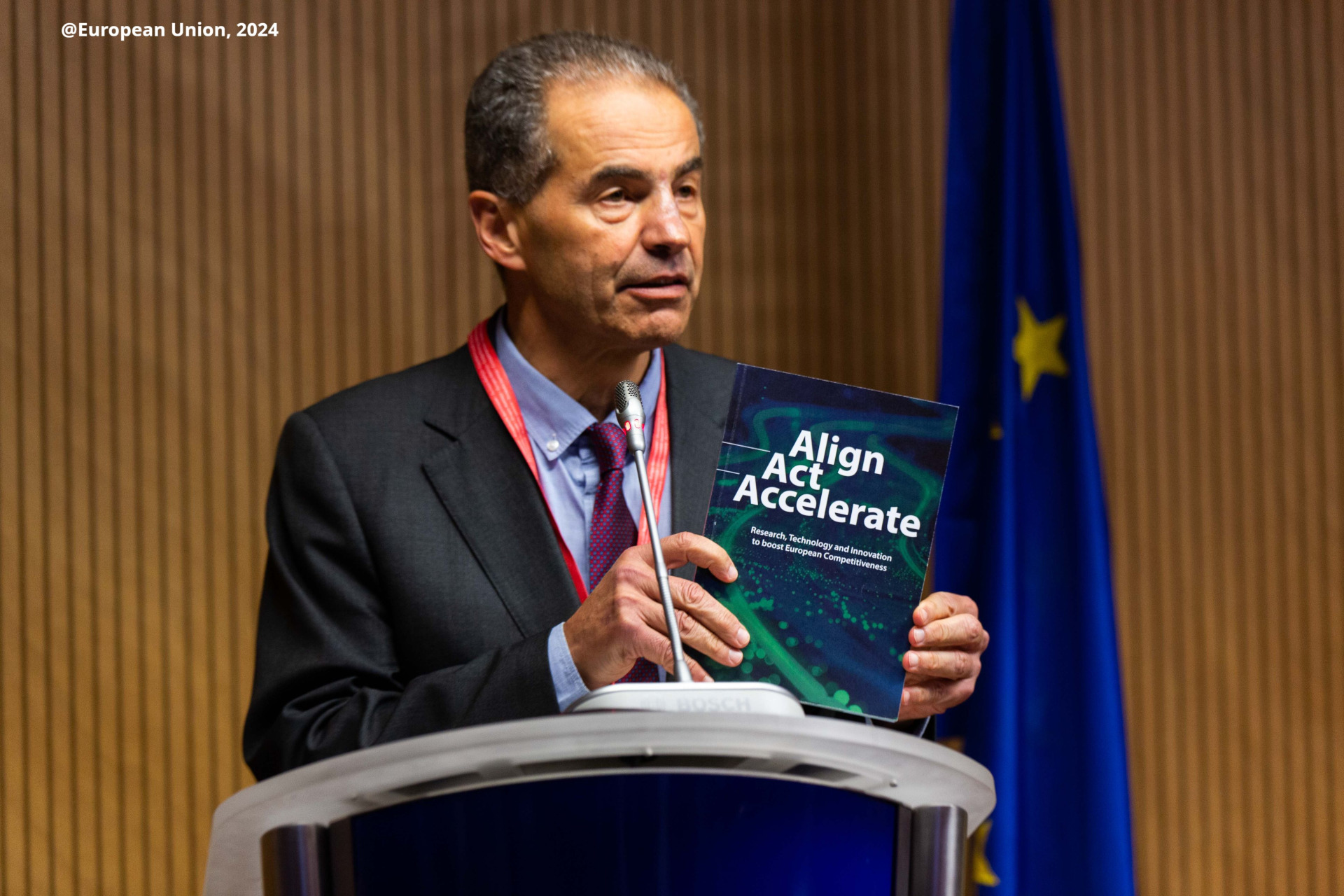
On 16 October, the Commission expert group responsible for the interim evaluation of Framework Programme 9 (FP9), also known as Horizon Europe (HEU), released its highly anticipated report, outlining a path forward for the remaining years of HEU and presenting a vision for the next Framework Programme (FP10). Steered by Manuel Heitor, Portugal’s former Minister of Science, Technology and Higher Education and professor at the University of Lisbon, the evaluation follows in the footsteps of three flagship publications that came before it – Ursula von der Leyen’s Political Guidelines, as well as the Letta and Draghi reports – all calling to urgently boost the European Union’s competitiveness and acknowledging the central role of research and innovation (R&I) in accomplishing this objective, deemed key to Europe’s survival.
The report, titled “Align, Act, Accelerate”, calls for utilising the political momentum on the topic to further unlock the potential of excellent research and impactful innovation across the Union, in order to invest in its future strength. Despite underlining the unique role of Horizon Europe as a research programme fostering excellence, large-scale research, and multi-country collaboration, and its higher success rate of proposals compared to its predecessor, the publication identifies numerous challenges to overcome, including the fragmentation of the EU research programme, the massive administrative burden faced by researchers, leading to additional costs and a growing period of time between calls and the obtaining of a grant.
The evaluation particularly alerts to the rise of disruptive and generative technologies, the worsening climate crisis, and the return of geopolitical competition. Underscoring the mounting pressure from China and the United States, the evaluation highlights the drop in the EU's contribution to global scientific publications and patent applications, as well as the stagnating quality of research and innovation jobs. It notably highlights China’s exponentially increasing RD&I expenditure, estimated to have risen by 3,299% between 1996 and 2020, while pointing out that US companies are now exploiting more European Research Council (ERC)-funded basic research discoveries than EU companies.
To address these challenges, the report proposes focusing on four interrelated spheres of action: competitive excellence, industrial competitiveness, societal challenges, and a strong research and innovation ecosystem. Amongst its main propositions, the report calls for an increase in the EU’s next Framework Programme budget to €220 billion, in order to better focus funding across the full spectrum of R&I, be able to fund all applications reviewed as excellent, and match the level of spending of the EU’s competitors.
The evaluation also recommends the radical simplification of the current research, development and innovation ecosystem in Europe, with increased focus on successful initiatives such as the European Innovation Council (EIC), the ERC, and the Marie Skłodowska-Curie Actions (MSCA), which notably develop disruptive, experimental R&I and foster the careers of young researchers. On the other hand, the report calls for the discontinuation of several “non-core, redundant and underperforming” programmes, such as, in the experts’ assessment, the EU Innovation Ecosystems (EIE) and the European Institute of Innovation & Technology (EIT). Similarly, current widening instruments, created to help EU countries that accessed the Union more recently increase their participation in the EU’s research programme, should be concentrated and simplified. Overall, the ‘Widening paradigm’ should become an ‘Advancing Europe’ paradigm, according to the publication.
The creation of an Industrial Competitiveness and Technology Council, along with a Societal Challenges Council, was highlighted as an essential component of the next EU research Framework Programme. The former would aim to boost private sector innovation and partnerships for industrial competitiveness, while the latter would foster reinforced links with civil society and address ‘societal challenges without significant industrial potential’, such as climate change, biodiversity loss, and respecting planetary boundaries.
In parallel, the report also advocates for a more attractive research and innovation ecosystem, further investments in infrastructure, reinforced university alliances, ambitious action at the national level, and better use of innovation procurement. It also warns of the inevitability of dual-use research, combining both civilian and defence applications. Interestingly, the publication provides a bold, utilitarian approach to international cooperation, emphasising that the same country can be a partner, a competitor, or a systemic rival, depending on the domain. He cites the telling example of the United States, which, despite its rivalry with China, has drastically increased the number of publications co-authored by Chinese researchers in recent years.
The expert group’s evaluation will now feed into the European Commission’s reflections and preparations for the remaining years of Horizon Europe, as well as for the next Framework Programme 10, set to replace Horizon Europe in 2028, which is expected to be presented by mid-2025 before being discussed by the co-legislators. Undoubtedly, the new Commissioner for Research and Innovation taking office on 1 December and the Commission’s rumored plans to create an overarching Competitiveness Fund will further affect the structure of FP10.